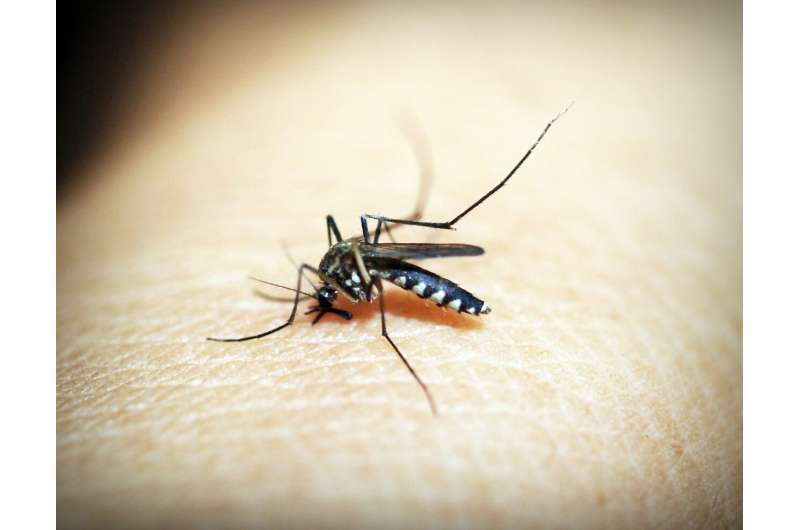December 1, 2023 feature
This article has been reviewed according to Science X's editorial process and policies. Editors have highlighted the following attributes while ensuring the content's credibility:
fact-checked
peer-reviewed publication
trusted source
proofread
As dengue expands beyond the global 'dengue belt,' scientists dispel conventional wisdom about the disease

Unknowns, dangers and surprises persist about dengue viral infection and now an assumption once accepted as conventional wisdom about immunity to the mosquito-borne disease may be incorrect.
New research involving epidemiological models and data from more than 4,400 people in Nicaragua suggests that it's time immunologists developed a new framework to understand population immunity to dengue. For decades, it was believed that once you were infected with dengue virus, the immunity lasted for life. The dogma persisted in the face of observational data, which found that people who were previously infected were more susceptible to severe dengue if infected again.
But an international collaborative group of researchers has now conclusively shown that immunity not only wanes, it tends to wax and wane—a discovery that reveals dengue infection to be far more complex than previously thought.
"Infection with multiple dengue virus serotypes is thought to induce enduring protection against dengue disease," writes Rosemary A. Aogo, lead author of a new research paper published in Science Translational Medicine. "However, long-term antibody waning has been observed after repeated dengue infection," Aogo added, referring to her team's new findings.
The waning of antibodies inevitably was followed by a boosting of antibodies when the next epidemic came along, Aogo and colleagues found. Her team's discovery allowed the construction of a new model that best describes population vulnerability to dengue infection, especially amid the known periodicity—the cyclic nature—of dengue outbreaks.
When it comes to dengue, people are not permanently immune but susceptible to infection, then immune and ultimately susceptible again. Hence, Aogo and her team's newly proposed model: "susceptible-infected-recovered-susceptible."
Dengue is a devastating viral infection transmitted to humans through the bite of Aedes aegypti mosquitoes—flying hypodermic needles that descend prolifically during significant outbreaks. Many dengue epidemics tend to occur in urban settings, scientists say.
Once known as break-bone fever, dengue viral infection can cause a severe headache, high fever, nausea, vomiting, swollen glands, and rash. Still, and perhaps most surprisingly, many people who are infected have no symptoms at all. In rare cases, however, dengue disease can be fatal.
The new research by Aogo and her collaborators examined blood samples from 4,478 children and adults in Nicaragua, a country in the heart of the world's dengue belt, which stretches from Central America and ranges throughout most of South America, then jumps across oceans and time zones to include most of sub-Saharan Africa, India, and Southeast Asia.
The world's worst dengue outbreak in 2023 was in a key dengue belt region, affecting tens of thousands of people in Bangladesh. There, the mosquito-transmitted virus killed nearly 1,500 people as of November 12, with more than 291,000 infected.
Aogo, a viral epidemiologist in the Laboratory of Infectious Diseases at the U.S. National Institute of Allergy and Infectious Diseases in Bethesda, Maryland, noted that she and her team unearthed additional stunning findings from their Nicaraguan data.
The researchers say they can now confidently predict that infection with the closely related Zika virus can bestow protection against dengue and even delay dengue outbreaks on broader scales. Indeed, the most recent Zika outbreak may have delayed the next dengue epidemic but later led to a dengue virus resurgence, which mostly impacted susceptible individuals, the study found.
Both dengue and Zika viruses belong to the flavivirus family, which are not only close cousins, they circulate in the same regions and have caused large epidemics in the last decade. The fact that one can provide immunity against the other is a discovery that has broad implications for developing antivirals and vaccines.
In their study, Aogo and colleagues analyzed the influence of the devastating 2016–2017 Zika epidemic, which showed that the Zika virus was sufficient enough to boost immunity against dengue. With this knowledge now in hand, the team, which included virologists from Nicaragua's Sustainable Sciences Institute in Managua, scientists now have a mother lode of new data as they face flavivirus epidemics in the future.
Aogo's research arrives as surges in dengue infections have been reported outside the usual tropical and subtropical regions where dengue is endemic. This past summer, dengue outbreaks occurred in parts of Italy and France. Scientists suspect global climate change has allowed dengue-carrying mosquitoes to broaden their range into new but now warmer regions of the globe.
Additionally, the World Health Organization has recently predicted that dengue will become a major threat in the southern United States, southern Europe, and new parts of Africa within this decade as Aedes aegypti mosquitoes continue to expand their range and take dengue virus along with them.
Dengue is the most common virus spread by mosquitoes, infecting as many as 390 million people annually worldwide. Most of the countries that are commonly affected tend to have outbreaks in cycles, which is vital public health planning information as countries devise improved mosquito control efforts and campaigns to help individuals stay safe. "This work provides insight into factors shaping periodicity in dengue incidence and may inform vaccine efforts to maintain population immunity," Aogo and her team concluded.
More information: Rosemary A. Aogo et al, Effects of boosting and waning in highly exposed populations on dengue epidemic dynamics, Science Translational Medicine (2023). DOI: 10.1126/scitranslmed.adi1734
© 2023 Science X Network


















